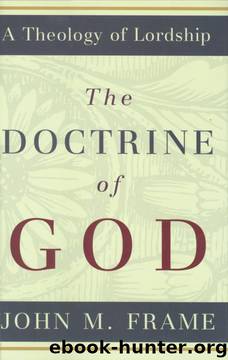The Doctrine of God (A Theology of Lordship) by John M. Frame

Author:John M. Frame [Frame, John M.]
Language: eng
Format: epub
Tags: Philosophy
ISBN: 9780875522630
Barnesnoble:
Goodreads: 277494
Publisher: P&R Publishing
Published: 2002-06-01T00:00:00+00:00
(Cf. also Ps. 148:5; Prov. 8:22-30;4 John 1:1-3, 10; Heh. 1:2; 11:3; 2 Peter 3:5-7.)
God's word also directs the course of providence. God not only brings the world out of nothing by his word, but also commands its course of action after that 22; 8:22). So,
((.'f. Job 37:12;5 Pss. 18:15; 29:3-9; 148:6-7; Matt. 8:26-27; Heh. 1:3; 2 Peter 3:5-7.)
The word is living (Heb. 4:12), and active also in judgment (e.g., Gen. 3:17-19; 6:7; 11:6-7) and in grace. It is his word that heals, saves, and delivers us. Note the emphasis on the word when Jesus heals the centurion's son in Luke (cf. Ps. 107:20). Scripture describes God's saving acts as words of God, speeches of God. Salvation begins when God speaks his decree before time. He executes that decree by sending the living Word, Jesus (John 1:1-14; 1 John 1:1-3). He draws us to himself by the word of effectual calling (Isa. 43:1; see chap. 4) and by the gospel. Paul says:
I am not ashamed of the gospel, because it is the power of God for the salvation of everyone who believes: first for the Jew, then for the Gentile. (Rom. 1:16; cf. Phil. 2:16; 1 Thess. 1:5; 2:13; 2 Tim. 1:10)
He calls us by a new name (Isa. 62:2; 65:15).
(jot-i's word, then, is involved in everything that he does-in his decrees, creation, providence, redemption, and judgment, not only in revelation narrowly defined. He performs all his acts by his speech.
Further, God and his word are always present together. Where God is, his word is, and vice versa. Note the many biblical correlations between God's word and his Spirit:? Genesis 1:2-3; Psalm 33:6 (cf. 104:30); Isaiah 34:16; 59:21; John 6:63; 16:13; Acts 2:1-4 (the coming of the Spirit leads to Spirit-empowered words); 1 Thessalonians 1:5; 2 Thessalonians 2:2; 2 Timothy 3:16 (the scriptural word is theopneustos, coming from the divine breath or spirit); 2 Peter 1:21 (the breath or Spirit of God carries the biblical writers along). The nearness of God is the nearness of the word (I)eut. 4:5-8; 30:11-14), and that nearness is the nearness of Christ (Rom. 10:6-8).
So in the word of God we see all of God's lordship attributes represented. We see his control in the word's powerful actions,` his authority in his words addressed to us, and his presence in the inseparability of his word and Spirit.
We have reason, then, to see God's speech as an essential attribute of his nature. Note also:
I. Scripture distinguishes the true God from Al the false ones, because he speaks; he is not dumb like the idols (Hall. 2:18-20; 1 Kings 18:24-46; Pss. 115:5-8; 1 Cur. 12:2).
2. One biblical picture of the Trinity is that the Father is the speaker (see the references above), the Son is the word he speaks (John 1:1-14; Rom. 10:6-8 lalluding to Deut. 30:11-141; 2 Cor. 1:20; Heb. 1:1-3; 1 John 1:1-3; Rev. and the Spirit is the breath that carries that word to its destination (Ps. 33:6; see footnote 7).
3. The speech of God has divine attributes: righteousness (Ps.
Download
This site does not store any files on its server. We only index and link to content provided by other sites. Please contact the content providers to delete copyright contents if any and email us, we'll remove relevant links or contents immediately.
| Buddhism | Christianity |
| Ethnic & Tribal | General |
| Hinduism | Islam |
| Judaism | New Age, Mythology & Occult |
| Religion, Politics & State |
Cecilia; Or, Memoirs of an Heiress — Volume 1 by Fanny Burney(31355)
Cecilia; Or, Memoirs of an Heiress — Volume 3 by Fanny Burney(30952)
Cecilia; Or, Memoirs of an Heiress — Volume 2 by Fanny Burney(30909)
The Secret History by Donna Tartt(16675)
Sapiens: A Brief History of Humankind by Yuval Noah Harari(13086)
Leonardo da Vinci by Walter Isaacson(11927)
The Radium Girls by Kate Moore(10923)
Sapiens by Yuval Noah Harari(4560)
The Wind in My Hair by Masih Alinejad(4430)
How Democracies Die by Steven Levitsky & Daniel Ziblatt(4426)
Homo Deus: A Brief History of Tomorrow by Yuval Noah Harari(4293)
Endurance: Shackleton's Incredible Voyage by Alfred Lansing(3857)
The Silk Roads by Peter Frankopan(3794)
Man's Search for Meaning by Viktor Frankl(3656)
Millionaire: The Philanderer, Gambler, and Duelist Who Invented Modern Finance by Janet Gleeson(3577)
The Rape of Nanking by Iris Chang(3530)
Hitler in Los Angeles by Steven J. Ross(3450)
The Motorcycle Diaries by Ernesto Che Guevara(3348)
Joan of Arc by Mary Gordon(3272)
